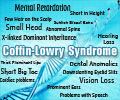Characteristics of Intellectual disability
Each intellectually disabled person presents with different types of characteristics, based on the severity of the retardation, adaptive skills and other co-existing disorders.
The characteristics of intellectual disability depend on the severity of the developmental delay and also the co-existing conditions.
Mild Intellectual Disability
- No unusual physical signs, but slight delay in developmental milestones.
- Capable of self-help skills.
- Can learn practical skills.
- Knowledge of reading, writing and mathematical abilities up to grade 3-6.
- Can function normally in the society.
- Normal social interactions and communicative skills.
Moderate Intellectual Disability
- May or may not have unusual physical signs.
- Noticeable delay in developmental milestones.
- Simple communicative skills.
- Can learn basic self-help skills, hygiene and safety skills.
- Can do simple tasks under supervision.
- Can travel to unfamiliar places with proper instructions.
Severe Intellectual Disability
- Noticeable motor impairment is seen.
- Significant delay in developmental milestones.
- Limited communicative skills, but can understand and respond to others speech.
- Routine self-help skills and repetitive activities can be taught and followed.
- Requires close supervision in social situations.
Profound Intellectual Disability
- Significantly slow in developmental milestones.
- Presence of congenital physical anomalies.
- Requires close supervision and constant care.
- Not capable of self-care routines and activities.
- Response to physical and social activities is possible only if done on regular basis.











